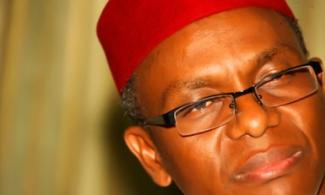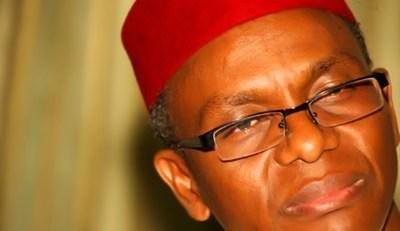
For the people of Kaninkon Kingdom in Southern Kaduna, this was a bleak Christmas. On Christmas Eve and on Christmas day armed Fulani herdsmen attacked and destroyed Goska village, killing, maiming, and burning. This attack occurred in spite of the area having been put under a 24-hour curfew by the state government, an indication of the brazenness and sense of impunity on the part of the well-armed attackers.
The attack is part of a broader genocidal war against the people of Southern Kaduna state, a war that is in its 5th year and has killed thousands of people in their homes and farms and destroyed the livelihoods of tens of thousands more. As we speak an estimated 53 villages lay in ruins, some of them occupied by Fulani herdsmen and their cattle, a forceful annexation that recalls the similarly forceful displacement in Agatu.
Let’s be clear: the crisis predates the administration of Governor Nasir el-Rufai, so he cannot be accused of causing it or of being behind it as some people are insinuating. However, his utterances and actions in the past and the present have exacerbated the problem and emboldened the attackers. An ill-tempered man given to incendiary, inciting, and divisive outbursts, El-Rufai has made several egregious errors in dealing with the crisis. Some of these errors are errors of approach, thinking, and mentality. The errors have inspired actions that have wittingly or unwittingly transformed what was a low-level series of massacres into a full-blown genocide.
To understand some of the Governor’s current failures in dealing with the killings, you have to understand his past utterances, his incendiary character, his insensitivity, and his inability to moderate his thinking and resultant public expressions, all of which offer clues about why he has no credibility or political capital to solve the problem and why he is widely perceived as part of the problem, not its solution. Let’s consider the governor’s many problems in this regard.
El-Rufai is widely regarded as a Fulani supremacist, and with good reason. On July 12, 2012, he tweeted the following: “We will write this for all to read. Anyone, soldier or not that kills the Fulani takes a loan repayable one day no matter how long it takes.” The governor’s response to the killings in Southern Kaduna has been eerily consistent with this mindset. In a recent chat with newsmen in Kaduna, the governor made three statements that substantiate this Fulani supremacist statement from four years ago.
First, he said when he became governor, he traced the attackers to Cameroon, Chad, and Niger and sent a message to them that one of their own, a Fulani like them, was now governor. This statement displays a spectacularly parochial mentality. A governor of a Nigerian state was basically making appeals based on ethnic kinship and brotherhood to a group of foreign killers of people in his own Nigerian state! In other words, he was appeasing his murderous foreign kinsmen at the expense of indigenes of his state who are not his ethnic kinsmen but whose safety and interests he swore to defend. The governor shocking statement indicates that ethnic solidarity trumped his constitutional obligations to protect Southern Kaduna citizens from the external threats of foreign Fulani herdsmen.
Second, the governor told the journalists that the crisis began in the aftermath of the 2011 presidential elections when foreign Fulani herdsmen passing through Southern Kaduna were attacked with some of them killed and their cattle stolen. The governor claimed that the ongoing genocidal killings are revenge for the 2011 attacks.
It was irresponsible for the governor to make this statement without providing a shred of evidence other than that this is what the foreign Fulani attackers told his emissaries who traced them to various neighboring countries. What the governor was doing was legitimizing the herdsmen’s genocidal campaign by giving it the cover of revenge. He was lending gubernatorial authority and credibility to the claims of foreign invaders that they are revenging the killing of their kinsmen on Nigerian soil! Shocking as it is, however, the governor’s current explanation is consistent with the tweet I quoted because he is still espousing and promoting what he, as a Fulani man, believes to be the Fulani ethos of revenge. El-Rufai was also doing classic victim blaming, blaming the victims for provoking the killers and bringing calamity upon themselves.
Then, of course, there is the fact that even if the claim of revenge were legitimate, one would be compelled to ask how much Southern Kaduna blood would need to be spilled to pay for the herdsmen and cattle allegedly killed in 2011. How long is this Fulani revenge spree supposed to last? Ten years? Twenty? Is this Fulani blood debt that El-Rufai speaks of eternal? This genocide has been going on for five years already. By the way, who or what gave foreigners the permission to freely violate Nigeria’s borders and penetrate deep into the Nigerian hinterland with their cattle and destroy farmlands in the process? Should any claim by people who have illegally breached our borders and destroyed the farmlands of Nigerian citizens be taken seriously let alone privileged above the suffering of citizens?
Third, El-Rufai stated that he had paid off the attackers as a way to stop them from continuing the killings. This is, of course, an explosive confession. He admitted to paying foreigners who illegally breached Nigeria’s borders to attack citizens of his state. This begs the question of why, in spite of the payments, the attacks have continued and have become more intense. It also advertises the governor’s poor judgment. He rewarded those who confessed to killing citizens of his state, instead of working with the federal government to hold them accountable or to stop them from further breaching our borders to kill citizens.
It is safe to say the governor’s poor judgment is anchored on ethnic solidarity with the foreign killers. Furthermore, to the extent that El-Rufai used state funds to pay the so-called compensation to the foreign killer herdsmen, the beleaguered people of Southern Kaduna, partakers in the state’s patrimony, were in fact being forced to pay their killers to stop killing them! It is not out of place to speculate that the killers may have used the governor’s payments to acquire more sophisticated weapons, which may explain why the scope, intensity, and sophistication of the killings have increased in recent months.
These confessed blunders are consistent with the governor’s character and past utterances. In an interview before he became governor, el-Rufai was asked about the killing of some Southern Nigerian youth corpers in the 2011 post-election violence in Kaduna. He objected vehemently to the premise of the question. He wondered why the press was obsessed with a few youth corp members who were killed by hoodlums and asked why there was no concern for “our people” who were killed in Southern Kaduna. By “our people” he meant Hausa-Fulani people. This interview was quite revealing, for it showed that he thinks of victimhood in strictly ethno-religious terms.
Today, as he gropes confusingly to get a handle on the killings, the governor is blaming nameless people he accuses of trying to “divide the people” along religious and ethnic lines. Such rhetoric from him is laughably hypocritical, for no one has contributed to the atmosphere of ethno-religious division in Kaduna State than El-Rufai. In his quest for power, he pandered shamelessly to ethno-religious loyalties, much to the consternation of those who regarded him as being above such sentiments. Having seemingly written off Southern Kaduna, a PDP stronghold, el-Rufai engaged in the most blatantly ethno-religiously divisive campaign in the state’s history, projecting himself as a champion of Fulani and Hausa-Fulani interest. He became a proud provincial man as his controversial tweets indicate, even though those who know him personally say the man is urbane and cosmopolitan.
El-Rufai is now captive to his own political posturing and long-held supremacist tendencies. His approach to the killings has continued to bear out his tendency for stoking unnecessary drama, for ethno-religious insensitivity, and for personalizing public issues. He sees the Southern Kaduna people as blame-worthy and the Fulani herdsmen killers as deserving of appeasement. A few weeks ago, as though to further humiliate the people of Southern Kaduna in their distress, the governor fancifully launched what he called “apology billboards.” The billboards were erected across the local governments of Southern Kaduna. In other words, El-Rufai’s solution to the killings is to force the people of Southern Kaduna, the victims, to apologize to their killers. It was a humiliating political subjugation of a people already under genocidal siege. The Southern Kaduna people were paying for billboards that apologized to their killers instead of the other way round. And this was haughtily done without consulting with the Southern Kaduna people.
As the governor blames others, including Niger Delta militants (!), he has not stopped to acknowledge that his past and present utterances and gestures have created an atmosphere of distrust between him and the people of Southern Kaduna and between the ethnic and religious groups of the state. He needs to look inward and take responsibility for stoking ethno-religious distrust and for emboldening the killers or at least giving them the impression that a sympathetic member of their ethno-religious group is in power, and that this kinsman is willing to legitimize their murderous cause and even pay them appeasement money. No wonder the people of Southern Kaduna attacked him on his visit there last week. They were tired of the governor’s condescending attitude, his empty preachments, and his efforts to humiliate them while rewarding their tormentors.
Helpless in the face of his inability to contain the rising current of ethno-religious division in the state, the governor has belatedly run to President Buhari to deploy more troops to Southern Kaduna communities. This is the same army, by the way, that on July 20 2014, El-Rufai tweeted the following about: “Genocidal Jonathanian army kills once again.” On that occasion, El-Rufai was condemning the killing of some Shiite members by soldiers. He was obviously pandering and opportunistically exploiting the Shiite’s sectarian angst because today he is the biggest persecutor of the Shiite in Nigeria. Moreover, he has partnered with the same army he described as genocidal to wage his war against the Shiite minority.
The proverbial chickens are coming home to roost for El-Rufai. His past utterances, his prior political posturing, his divisive, incendiary, and insensitive ethno-religious pandering and comments are coming back to haunt him. He has no one but himself to blame. He has little sympathy, having arrogantly and selfishly alienated foes and friends alike.
El-Rufai’s current travail offers a poignant lesson, which is that those seeking political positions should moderate their supremacist ideologies, temper their arrogance, and stop pandering to or riding the wave of popular but fleeting primordial anger.
The author can be reached at [email protected]
